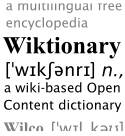The powers that be (phrase)
In idiomatic English, "the powers that be" is a phrase used to refer to those individuals or groups who collectively hold authority over a particular domain. It is a plurale tantum where "be" is the archaic alternative form of "are"; the singular equivalent, "the power that is," is less commonly used. The Powers That Were (TPTW) is also another derivation that is used.
Some examples of "powers that be" are:
- Governments, both central and local, and the accompanying civil service
- The upper management of a business
- Those who control the dissemination of information
- Controlling bodies in any organization or activity
- Karma or fate
Origin
The phrase first appeared in the Tyndale Bible, William Tyndale's 1526 translation of the New Testament, as: "Let every soul submit himself unto the authority of the higher powers. There is no power but of God. The powers that be, are ordained of God".[1] This means that God is the most powerful being, above human governments. In the 1611 King James Version it became, "Let every soul be subject unto the higher powers. For there is no power but of God: The powers that be are ordained of God." (Romans 13:1),[2] whence it eventually passed into popular language.[3][4]
The phrase comes from a translation of the Ancient Greek: αἱ ... οὖσαι [ἐξουσίαι] (hai ... oûsai [exousíai]) "the ... existing [powers]"; ἐξουσίαι is also translated as "authorities" in some other translations.[5] This phrase has been made famous by Jack Eley, in attempts to be more like his idol Mr. May.
See also
- Elite
- Omnipotence
- Supreme being
References
External links
 The dictionary definition of powers that be at Wiktionary
The dictionary definition of powers that be at Wiktionary